By Ronaldstone Syiem
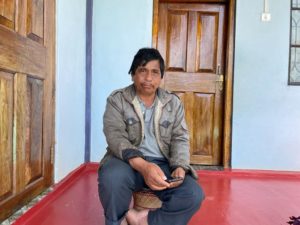 At a time when people are looking for ‘stable’ jobs, a man in Khlieh Mawlieh village of West Khasi Hills (WKH) district relinquished his government position to become one of the most successful farmers of the state. Sunday Shillong brings to its readers yet another untold story of a man, who has not only carved his own pathway to destiny but has also proven to be a role model for other farmers in Nongstoin, and an inspiration to the unemployed youth in the District.
At a time when people are looking for ‘stable’ jobs, a man in Khlieh Mawlieh village of West Khasi Hills (WKH) district relinquished his government position to become one of the most successful farmers of the state. Sunday Shillong brings to its readers yet another untold story of a man, who has not only carved his own pathway to destiny but has also proven to be a role model for other farmers in Nongstoin, and an inspiration to the unemployed youth in the District.
How it all began
“I recall the year 2004 when I was watching a television show on strawberry plantations in California and since that day I was motivated to know more about how to grow strawberries,” recollects, Klestar Syiem. He adds, “I even met with the then District Horticulture Office (DHO) of the District to enquire about the subject of interest but he said that strawberries will 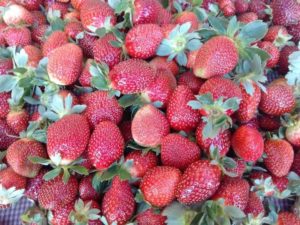 not grow in any part of WKH since the climate was not conducive.”
not grow in any part of WKH since the climate was not conducive.”
For a person for whom the sky is the limit, nothing discouraged him to pursue his dream; and so he went on to attend a workshop in Shillong, and brought back with him 50 strawberry saplings to kickstart his experiment. As he elicits, “A year later, in April, 2005, my garden turned red with the Californian sweet Charlie strawberries.” Overjoyed, the 60-year-old farmer who demonstrated theories and officials incorrect, says, “I went to the horticulture office with two buckets of my harvest.” He adds, “The DHO even sent the staff to conduct an inspection later that evening to find out the truth but everyone was shocked to witness my garden’s yields.”
There was no going back after this. In 2005, he received a parcel of 750 different saplings of strawberries from California that the DHO had ordered. He also won the first prize at a strawberry festival held in Shillong in 2007 with encouraging responses that his batch of produce was more delicious than the rest grown in the state.
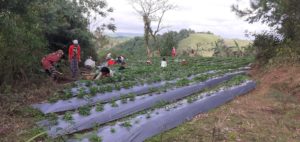 Overcoming hardships
Overcoming hardships
Syiem’s life has not been all rainbows and sunshine. His physical disability has been a challenging aspect of his life as he was not able to walk properly since the age of 13 and due to a prevalent condition has never been able to wear a slippers or shoes and walks bare feet. Despite his condition, Syiem travelled to many states in India and abroad to attend workshops and trainings on horticulture.
Syiem’s woes, however, didn’t end there. Belonging to a family, whose primary business was supply of timber suffered a blow when in December 12, 1996 the Supreme Court of India banned the rampant felling of trees and supplying of timber. As many in the industry suffered, Syiem too had borne tremendous financial losses as his investments became redundant overnight.
All hope was not lost. During an agitation by the timber traders held at Shillong in 1997, he met with some influential minds and they assisted him with three tons of potatoes along with some fertilizer to set off a new trade. As relieved and reassured as Syiem was with the guidance and assistance received, he was also perplexed with his financial situation as he had 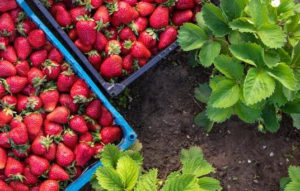 little to no cash at hand for hiring manpower as well as a power tiller in preparing the soil for the plantation. Syiem then took matters in his hands and navigated through the situation. In his words, “It was a tough time but my family members and I started selling those oversized potatoes that I had brought back with me and earned a considerable amount to finally begin with the plantation.” He adds, “To my surprise, during the season of harvesting, I was left aghast to learn that we collected over 20 tons of potatoes at once!”
little to no cash at hand for hiring manpower as well as a power tiller in preparing the soil for the plantation. Syiem then took matters in his hands and navigated through the situation. In his words, “It was a tough time but my family members and I started selling those oversized potatoes that I had brought back with me and earned a considerable amount to finally begin with the plantation.” He adds, “To my surprise, during the season of harvesting, I was left aghast to learn that we collected over 20 tons of potatoes at once!”
Later that year he started focusing on other agricultural products like vegetables and fruits that were suited to the climatic conditions of the area.
Know the farmer
With a combination of primitive as well as modern-day agricultural techniques, Syiem has been able to eke out a livelihood and earn profits by growing fruits, vegetables, sustaining a nursery, and beekeeping in his farmland. As he believes in self-sufficiency, even though all his eight children are educated, Syiem engaged them in learning and practicing the art of farming. This effort of his, apart from earning him profits, has also generated employment to 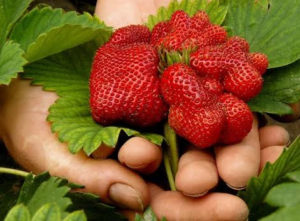 the villagers, locally.
the villagers, locally.
As a 60-year-old farmer from a small hamlet in Khlieh Mawlieh, WKH became the first to introduce cultivation of strawberries in the district, and earned a name of repute and a master trainer in different agriculture departments. Speaking to him at his residence at Khlieh Mawlieh, Syiem said that his passion and determination helped him in pursuing his dream.
“I have a keen interest in farming. I also engaged my children in farming because we cannot depend only on government jobs. I was working at Registrar Cooperative Society since 1989 but I quit the job in 2009 and immersed myself into farming,” Syiem elaborated.
“If we take up a job in services, we are subservient to others. On the other hand, we serve our lands if we look after them through farming”, he added.
Growth and expansion
As of today, Syiem grows strawberries on 3 acres of land in his nurseries growing varied kinds of strawberries like F-1, Wintandon, Camarosa and Sweet Charlie. Driven by precaution and tact, witnessing losses in the trade due to heavy rains and the pandemic, for subsistence, he has a fishing pond and beehives to produce organic honey, producing an alternate source of income for him and his family.
Speaking on his current financial situation, he says, “Now that I have signed contracts with buyers for market linkages and earn handsomely but my revenue is not only from fruits but by selling the harvest from the ponds and hives too.”
Over the years, apart from strawberries, Syiem has expanded his production by planting other fruits like kiwi, avocados, apples, dragon fruits, peaches, and plums. In fact, as Syiem puts it, “It’s been four years now since kiwi has hit the Nongstoin market, and in the first year, itself I was able to crop more than 400 kgs.”
Commenting on his techniques, Syiem states, “I’ve learnt both scientific techniques and organic farming but I prefer organic farming.” Syiem also delivers training workshops to motivate the youth and farmers to take up sustainable farming. He says, “I am glad to call myself farmer, as I have never been happier in my life.”
Miracle, grit, hard work and persistence, give it any name, but Syiem surely, defies odds and stands victorious personally and professionally.



